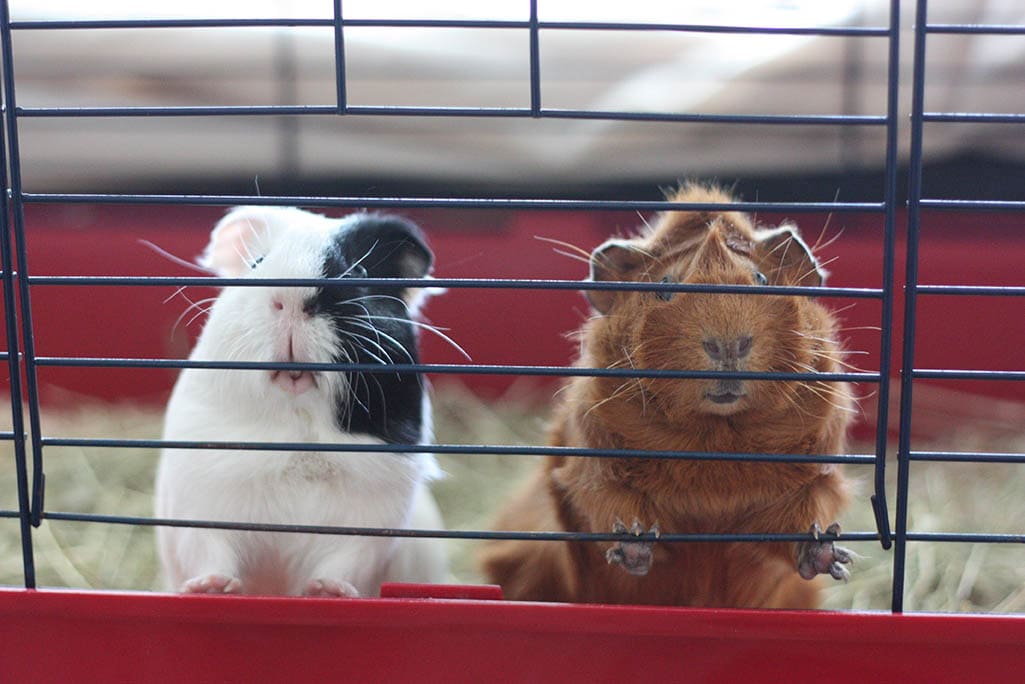
Did you know that guinea pigs have been incorrectly named? First of all, they don’t come from New Guinea—they actually originated in Peru in the Andes Mountains. And secondly, they are not related to pigs in any way. It is believed that they were named “pigs” because of the cute little squealing noise they make that sounds somewhat piglike.
Your guinea pig’s diet, like with any pet, is of the utmost importance. You want to be sure that you’re fulfilling your cavy’s daily dietary requirements and that you’re not feeding them anything that isn’t good for them.
We’re going to explore everything diet-related for guinea pigs so you can provide your pet with the healthiest diet possible. We all want our cavies to thrive.
What to Feed Guinea Pigs
We’re going to go over the different kinds of foods your guinea pig can and cannot eat. The most essential food in the cavy diet is hay. In fact, 80% to 90% of their diet should be composed of hay. Examples of acceptable hay include timothy, orchard, grass, and oat hay.
Vegetables and herbs should make up 10% to 15% of their diet and guinea pig pellets about 5% to 10%. The occasional treat can be thrown in as well (usually in the form of fruit).
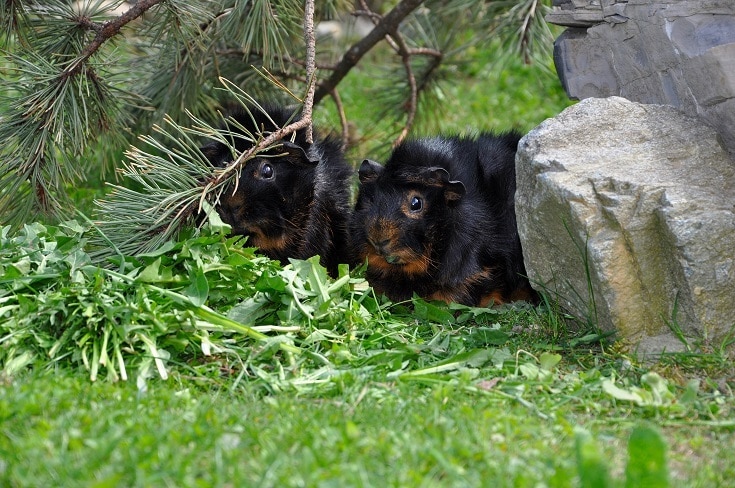
Vegetables for Guinea Pigs
| Best Vegetables to Feed Guinea Pigs: | Additional Vegetable Options: |
You should offer about 1 cup of fresh vegetables to your guinea pig every day. When offering them vegetables, variety is key—it’s best to mix different types of healthy vegetables rather than sticking to just a few options.
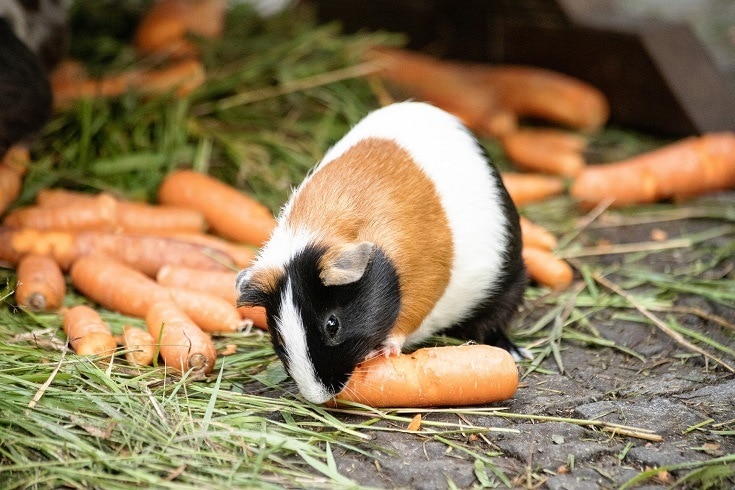
Fruit for Guinea Pigs
The fruit from this list is good for your guinea pig because they are all sources of vitamin C, but since they are also high in sugar (even if the sugar is natural), they should be limited to once a day or no more than a few days a week.

Foods That Are Not Good for Guinea Pigs
The reason these foods should be avoided is that they are either toxic or cause digestibility issues for guinea pigs, which are detrimental to their well-being.
How Much Water?
Just like for almost every living thing on the planet, water is essential for guinea pigs. Water should be provided in water bottles designed for rodents, and they should have access to fresh water 24 hours a day.
This means filling the bottle once a day with fresh water and always checking that the water bottle is working properly and that it hasn’t run out. Consider investing in a larger bottle if your water is constantly running dry throughout the day.
Sample Guinea Pig Feeding Chart
| Guinea Pig Feeding Schedule | Food |
| Monday | |
| *with fresh water, hay, and pellets | Broccoli |
| Cucumber | |
| Parsley | |
| Lettuce mix | |
| Fruit Day! | |
| Tuesday | |
| *with fresh water, hay, and pellets | Red pepper |
| Carrots | |
| Coriander | |
| Lettuce mix (try endive!) | |
| Wednesday | |
| *with fresh water, hay, and pellets | Parsnip |
| Celery | |
| Parsley | |
| Lettuce mix | |
| Fruit Day! | |
| Thursday | |
| *with fresh water, hay, and pellets | Zucchini |
| Cucumber | |
| Broccoli | |
| Lettuce mix (try radicchio!) | |
| Friday | |
| *with fresh water, hay, and pellets | Green pepper |
| Carrots | |
| Coriander | |
| Lettuce mix | |
| Saturday | |
| *with fresh water, hay, and pellets | Tomatoes |
| Cucumber | |
| Parsley | |
| Lettuce mix | |
| Fruit Day! | |
| Sunday | |
| *with fresh water, hay, and pellets | Celery |
| Carrots | |
| Coriander | |
| Lettuce mix |
Source: https://www.animallama.com/guinea-pigs/guinea-pig-feeding-schedule/
This chart is just an example of what your cavy could eat throughout the week. By using the lists further up, you can make changes and adjust as you see fit.
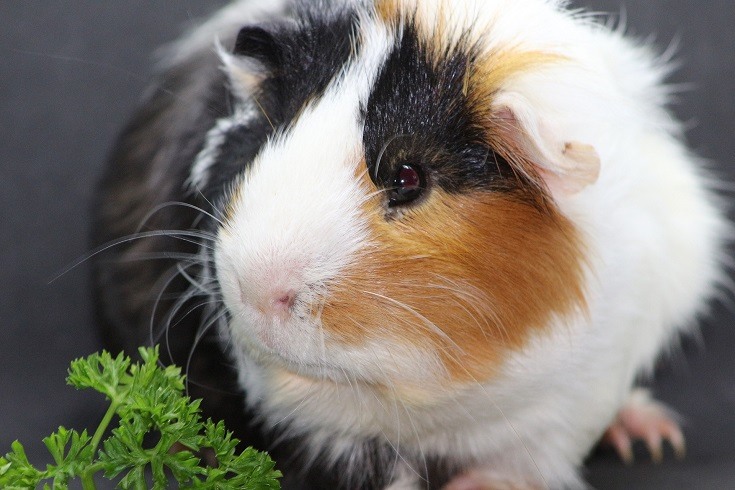
When to Feed Guinea Pigs
Since hay is such a vital part of the guinea pig’s diet, it should be made available at all times.
Other than the hay, it’s a good idea to feed your cavy two times a day, in the morning and in the evening, to help prevent overeating and consequently, obesity. Always remove any uneaten pellets about 6 hours after your cavy has eaten and any fruit or vegetables after 2 to 4 hours.
This also includes any hay—always discard old hay before you add in the fresh.
- Related Read: How Long Can a Guinea Pig Go Without Food & Water?
Is Vitamin C Necessary for Your Guinea Pig?
Vitamin C is absolutely essential for your cavy! Like us humans, guinea pigs are unable to produce their own vitamin C, so it’s crucial to add vitamin C to supplement their diet. Without this vital vitamin, guinea pigs are prone to scurvy.
Your cavy should be seen by a vet if you notice any of these signs.
Although many guinea pig pellets are fortified with vitamin C, it tends to denature rather rapidly once the product is unsealed. This is why vegetables are crucial for your guinea pig, as they provide a fresh source of vitamin C on a daily basis. The vitamin C needs of your guinea pig change depending on their life stage. You should consult your veterinarian to ensure that your guinea pig is receiving adequate amounts of vitamin C in their diet.
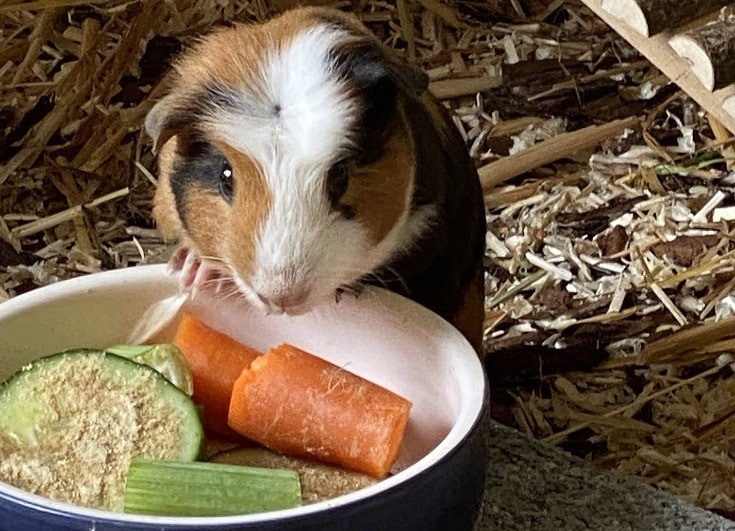
What Are the Best Natural Treats for Guinea Pigs?
Fruits are the most popular treats for guinea pigs. Many provide guinea pigs with vitamin C and are naturally safe for consumption. That said, fruits should be offered sparingly, as they are often quite high in naturally occurring sugars (especially compared to vegetables). They also tend to sludge and spoil rapidly when left outside. Therefore, any uneaten fruits should be removed after about 2 hours (at most), and the dishes that they were served in should be thoroughly washed.
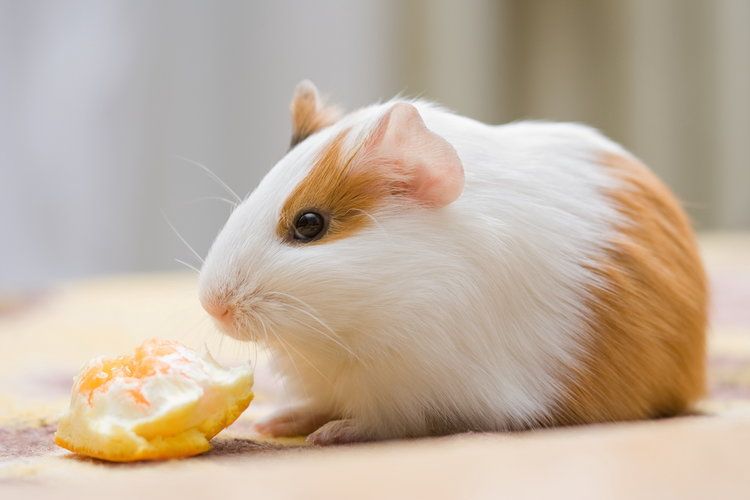
What to Do If Your Guinea Pig Isn’t Eating
There are a number of reasons why your guinea pig might not be eating that range from illness to stress. Everything from an issue with their teeth to changes in their diet or even environmental changes could trigger a loss of appetite.
If you’ve noticed these signs, you should take your guinea pig to the vet as soon as possible:
If your pet only seems to have lost their appetite and doesn’t appear to have other signs, you should still take them to your vet. Refusal to eat is a potentially serious problem in guinea pigs.
- You may also want to know: What Fruits Can Guinea Pigs Eat? What You Need to Know!
Conclusion
The diet of your pet is an absolutely vital part of keeping him healthy and happy. As long as you do your homework and understand what food is good for your guinea pig and what food you should avoid, you can develop a unique and individual diet that will suit your cavy’s preferences. We all want our pets to live an enjoyable and long life.
If you have any questions or concerns about your guinea pig’s diet, you should contact your veterinarian for more information.
Related Reads:
- Can Guinea Pigs Eat Rabbit Food? What You Need To Know!
- How to Get Guinea Pig to Drink Water: 7 Vet-Approved Ways
Featured Image Credit: CC0 Public Domain, Pxhere








